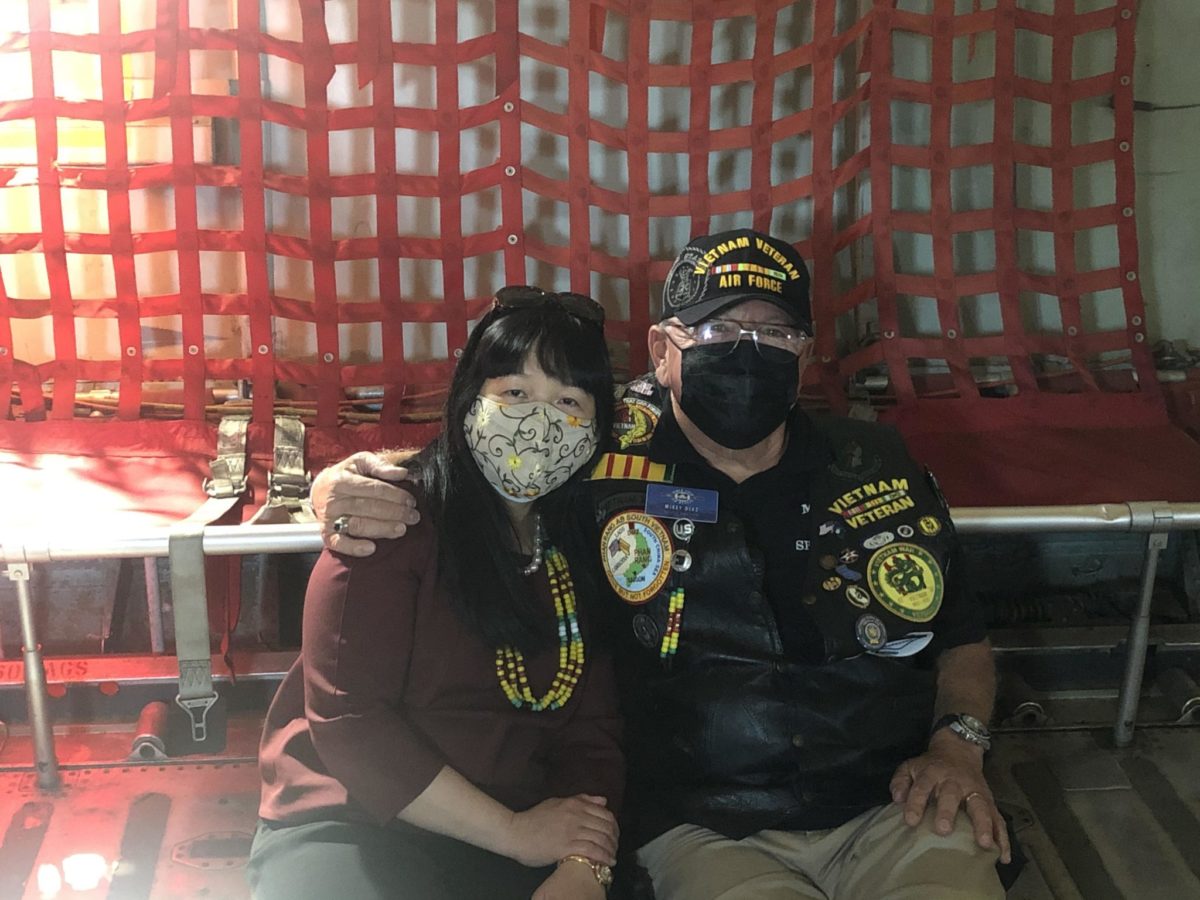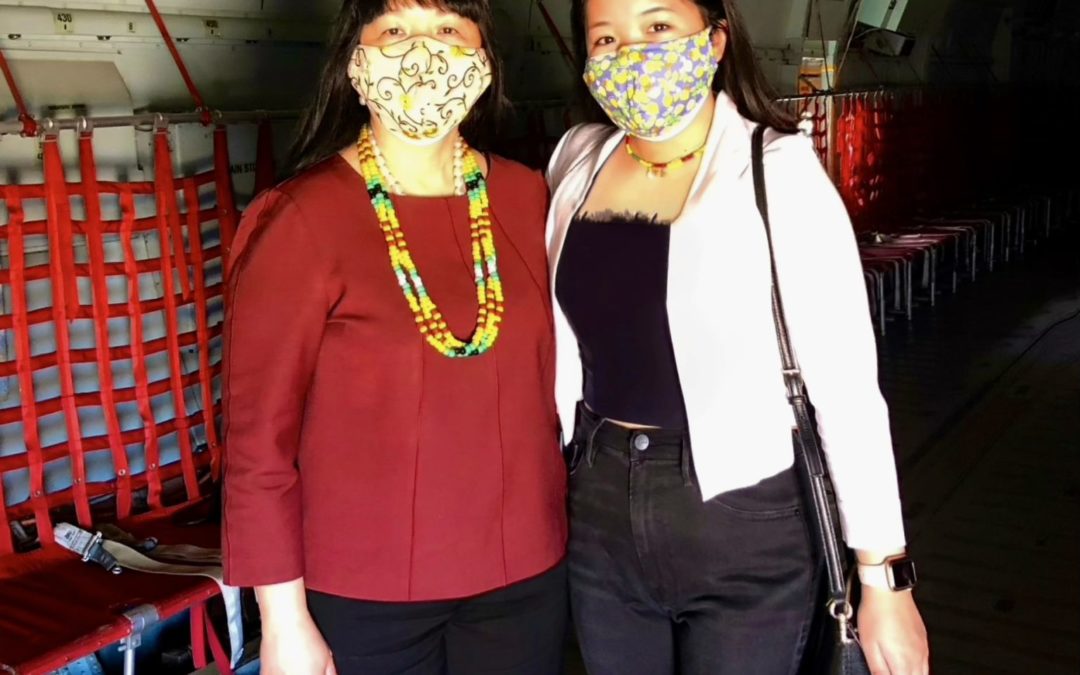
We climbed up the small metal ladder onto the vast, humid C-141 military aircraft in the unpredictably sweltering heat of late March. It was not every day that visitors could board and explore the retired plane. Although dimly illuminated by the sunshine radiating through the tiny windows on the doors, the jet was dark inside and almost completely empty. There were no commercial passenger seats, except for red cargo nets hanging above the benches lined against the plane’s walls. My parents and I listened intently as “Grandpa” Mikey shared his great wealth of knowledge on C-141s. Before we stepped off the plane, my mom took a seat on the floor next to one of the backdoors… perhaps in the exact spot where she sat 46 years ago, just months after the Fall of Saigon. But this time, instead of being sardined in between the other Vietnamese refugees, she was humbly joined on the floor by Vietnam War veteran Mikey Diaz.
Where does our life story really begin with its unexpected roller-coaster twists and turns? This spring, many Vietnamese-Americans will commemorate the 46th anniversary of the Fall of Saigon, which forced hundreds of thousands of South Vietnamese refugees to literally run for their lives. An infamous yet pivotal day that marked not only the end of the civil war that killed millions of Vietnamese soldiers and 47,434 American GIs over a span of thirty years… but also the beginning of a diaspora to America, the sanctuary for safety from political persecution by the communist government.
Let’s take a step back in time to April 30, 1975. My mother was a child then, but she can still remember hearing the thunderous military explosions that foreshadowed the official end to the war and the escape from feared retribution. With no pictures to remind her of the early childhood in Vietnam, she can only reflect on the lingering memories of the bygone era as the boat carried her into the open seas, where the American soldiers handed out Chiclets to the kids and food provisions during the ocean rescue. With a military escort, she disembarked at Subic Bay in the Philippines, where she saw chó nóng (small hot dogs) on lunch plates for the first time. She was transferred some months after to the haunted Wake Island and its burial ground of American troops who lost their lives during World War II. Then, she finally boarded a flight to the refugee camp of Fort Chaffee, Arkansas, before the First Congregational Church sponsored her family to resettle in Rockford, Illinois. By the time she went to college, she had attended five elementary schools, two middle schools, and two high schools. Mom had acculturated to having a new school every academic year. Furthermore, she endured the harsh reality of poverty and illiteracy that laid the foundation of stepping stones empowering her to work hard for the future. She was in constant survival mode to make it to the next stage of life.

When she started her internship at the Medical College of Virginia and the Hunter Holmes McGuire VA, she was reawakened by the forgotten memories of the Vietnam War from years before. The Vietnam veterans rekindled the lost feelings, smells, and sights hitherto cemented beyond reachable consciousness. They made her reminisce about the faded past, and she really wanted to help her veteran patients. But, from the perspective of an ordinary American and as a resident physician, she lacked the in-depth knowledge about the Vietnam War, which is often briefly covered in school or college. Through the years, she tried to educate herself more about the conflict. And, when I saw that Dr. Andrew Howe was teaching the course “The Vietnam War and Its Aftermath” last fall, I suggested to my mom about asking Dr. Howe for permission to view the class lecture material.
Dr. Howe graciously agreed and later introduced my mom to Mr. Mikey Diaz, a Vietnam Air Force veteran, who was stationed in Phan-Rang from 1969 to 1970. After his tour of duty, he worked for the LAPD. In recent years, he has volunteered at the Riverside March Field Air Museum on Fridays through Sundays to help with the day-to-day operations, support fellow patriots, and impart to the public about the legacy of the Vietnam veterans.

My family and I met Grandpa Mikey for the first time on March 27, 2021, during the Welcome Home Vietnam Veterans event. Grandpa welcomed us with beautiful bead necklaces composed of yellow and red to represent the South Vietnamese flag and green to signify the jungle. He showed us the rows of well-preserved military uniforms (e.g., from the Civil War, WWI, WWII, Korea, etc.), war relics, and cargo planes that have been either donated or purchased over the years. He took us onto the huge C-141 aircraft after my mom told him about her flight from Wake Island to Fort Chaffee on July 13, 1975. Grandpa conjectured that this could have been that fateful plane. He proceeded to sit down with her on the floor like she did years ago as a little girl “in front of the door, the dark nets behind me…” They hugged one another and cried in a surreal moment of shared humanity and overflow of pent-up emotion, unleashed after more than four and a half decades of a traumatic war that once scarred the hearts… tormented souls coming to grips with a polarizing war and remembrance five decades later. Grandpa provided a powerfully protective and transformative emotional experience of shared circumstance, in which he recalled that they were both in Vietnam and unknowingly breathed the “same air, times, emotions, and country” in 1969. Once we stepped off this historic monument to take more pictures, Grandpa Mikey’s chivalrous nurturance of “a prince” and magnanimous acceptance — of mom as his daughter and of me as his grandchild with welcoming arms — transcended any doubts of insecurity, especially when mom inquired if I could call him uncle. Grandpa’s perspicacity broke down the barriers of what he referred to as “sand bags,” forging the beginning of a loving relationship between his “little girl and baby granddaughter.”

I owe much heartfelt gratitude to Dr. Howe for reuniting two families from opposite sides of the world. Never in my life would I have imagined that my parents and I would become so naturally close to someone we just met. Grandpa Mikey has impacted our lives so immensely. When my parents, Grandpa, and I were standing in the museum gift shop before parting on our first visit, my mom had embraced her newly founded father with open arms. Prior to visiting that day, I promised myself not to be emotional. This was my mom’s moment, not mine. Yet, I could not prevent the tears from streaming down my cheeks and flooding my masks as I struggled to even whisper “thank you” to Grandpa. I was touched by the kindness and acceptance of someone who had been nothing but a stranger less than three hours before. I knew that this was truly going to be something special. It was a silent but profound moment for everyone in the room. We all cried. I will never forget the day that our families bonded forever. All of us are incredibly blessed to have found each other in this lifetime… even if it was more than half a century later. I am so overjoyed that my mom has finally found the answer to her prayers, and someone to guide her on this “journey to the past” to discover more of the childhood swept away by the chaotic devastations of war. Grandpa and mom saved each other.
God has granted me the gift to continue carrying on the stories of generations before me. I am beyond honored to not only continue my mom’s story but also to share Grandpa’s personal narratives in this Honorgram piece. Sergeant Diaz, Welcome Home to your blended and beloved family. We love you, Grandpa. Thank you for your valiant service and for being an extraordinary grandfather.
— Ailinh Nguyen (Class of 2023, Biomedical Science)

